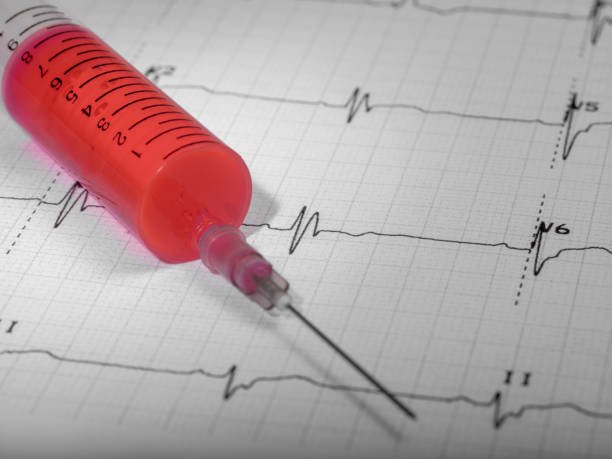
Can’t Tell the Difference Between a Cardiac Shot and a Cardiotonic Drug? Understanding Cardiotonic Drugs
We often hear people say “give a shot in the heart” when a patient is critically ill. What is the role of inotropic agents themselves? Is it like in the movies and TV shows that one injection can extend your life when you are critically ill? Let this article introduce to you the uses, types and side effects of cardiac injections.
What are cardiotonic drugs?
You may have heard of cardiac shots or cardiotonic drugs, which actually refer to drugs that change the contraction of the heart muscle and the output of blood. For example: foxglove, dopamine, etc. A broad definition of cardiotonic drugs may include epinephrine (also known as Adrenaline) or norepinephrine (Norepinephrine).
We see in movies and TV shows that when a patient in need of emergency treatment still cannot wake up after undergoing cardiopulmonary resuscitation (CPR), the doctor may inject epinephrine (Epinephrine) or norepinephrine (Norepinephrine), two pressurizing agents. It increases the patient’s blood pressure and heartbeat, so some people call it a cardiac shot.
In addition, heart drugs such as beta-blockers (β-blockers) and calcium ion blockers (Calcium channel blockers) can also be regarded as a type of cardiotonics.
Types and effects of cardiotonic drugs
Cardiotonic agents are drugs that can change the contractility of the heart. They can be mainly divided into two types: Positive Inotropic Agents and Negative Inotropic Agents. Doctors will choose the appropriate cardiac agent based on the type of heart disease.
Positive Inotropic Agents
Common cardiotonic drugs include Digoxin, Dobutamine, and Milrinone. They enhance the heart’s ability to contract, allowing it to pump more blood with fewer beats. It is usually used in patients with heart failure, cardiomyopathy, or recent myocardial infarction.
For example, foxglove can increase cardiac contractility by increasing the concentration of calcium ions in heart cells. When patients take foxglove, the drug binds to sodium and potassium receptors in the heart muscle. They prevent calcium ions from leaving the cells, allowing calcium ions to gradually accumulate in the cells, triggering stronger heart contractions.
Dobutamine is a β-agonist that mainly acts on β1 sympathetic nerve receptors to enhance myocardial contractility and reduce left ventricular afterload. Mainly used to treat cardiogenic shock and severe heart failure.
Milrinone is an inhibitor of phosphodiesterase 3, and phosphodiesterase is an enzyme that breaks down cAMP. cAMP can increase the activity of protein kinase A (PKA), which is related to myocardial contraction. Therefore, Milrinone can reduce the decomposition of cAMP, thereby increasing myocardial contractility. Mainly used to treat heart failure and pulmonary hypertension.

Negative Inotropic Agents
Weaken the heart’s ability to contract, slow down the heart rate, and lower blood pressure. Commonly used for hypertension, chronic heart failure, arrhythmias and chest pain. This drug may also be used in patients with myocardial infarction to reduce stress on their hearts.
Negative cardiotonic agents include beta-blockers, calcium channel blockers, etc. The former can prevent epinephrine from binding to beta receptors on nerves, slowing the heart rate and dilating blood vessels. , to lower blood pressure. Calcium ion blockers are the opposite of the foxglove mentioned earlier. They slow down the entry of calcium ions into the heart muscle, slowing the heartbeat and dilating blood vessels.
Cardiotonic side effects
Although cardiotonic drugs can change the contractility of the heart, they can also bring the following side effects to the human body:
- Hypotension: usually occurs with negative inotropes.
- Palpitations: Palpitations usually occur with positive inotropes. Pay special attention to cardiac arrhythmias caused by foxglove poisoning. In addition, negative cardiac inotropes may cause severe bradycardia.
- Dizziness, headache
- Difficulty or rapid breathing.
- Sweat.
- Faint.
- Blurred vision, double vision, photophobia, and you may see yellow, green, or white halos around objects. People with this symptom should pay special attention to chronic foxglove poisoning.
- Nosebleeds, gum bleeding: usually occur with positive inotropes
- Fatigue
- Diarrhea
- Feel sick and vomit
- Loss of appetite or upset stomach
- Erectile dysfunction: Usually occurs with negative cardiotonic agents such as beta-blockers, but other positive cardiotonic agents such as digitalis may also have an effect.
- Male breast enlargement: usually occurs with negative cardiotonic calcium blockers such as Verapamil, Nifedipine, Diltiazem, but other positive inotropes can also have an effect, such as digitalis.
- Decreased libido: usually occurs with negative cardiotonic agents such as beta-blockers, but other positive cardiotonic agents may also have an effect, such as foxglove.
Generally speaking, patients who have taken negative inotropes will not use positive inotropes unless specifically instructed by their physician. Listed below are some drugs and precautions that may have an impact on cardiotonic drugs. If the patient needs to receive cardiotonic drugs, please inform the doctor which drugs you are taking to avoid adverse effects.
- Cholesterol-lowering drugs
- Weight loss pills
- Laxatives or antidiarrheals
- Over-the-counter medicines for colds, coughs, and sinusitis
- Eye drops
- Antacids containing aluminum or magnesium
- Avoid caffeinated beverages such as coffee and tea
- Do not eat grapefruit or drink grapefruit juice
Cardiotonic drugs are not a panacea. They still need to be combined with other heart disease treatments to improve the patient’s disease. As a first-aid cardiotonic drug (adrenaline injection), it is to help medical staff gain more time to perform other medical actions, rather than Radical treatment. If the patient has determined that his condition cannot be improved in any way, injecting cardiotonic drugs will only forcefully postpone the patient’s inevitable death.












